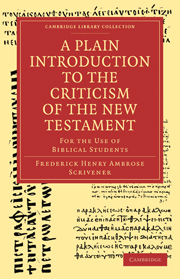Book contents
- Frontmatter
- ADVERTISEMENT
- ADDENDA ET CORRIGENDA
- Contents
- CHAPTER I PRELIMINARY CONSIDERATIONS
- CHAPTER II ON THE GREEK MANUSCRIPTS OF THE NEW TESTAMENT
- CHAPTER III ON THE ANCIENT VERSIONS OF THE NEW TESTAMENT IN VARIOUS LANGUAGES
- CHAPTER IV ON THE CITATIONS FROM THE GREEK NEW TESTAMENT MADE BY EARLY ECCLESIASTICAL WRITERS
- CHAPTER V ON THE EARLY PRINTED, AND LATER CRITICAL EDITIONS OF THE GREEK NEW TESTAMENT
- CHAPTER VI ON THE LAWS OF INTERNAL EVIDENCE, AND THE LIMITS OF THEIR LEGITIMATE USE
- CHAPTER VII ON THE HISTORY OF THE TEXT, INCLUDING A DISCUSSION OF RECENT VIEWS OF COMPARATIVE CRITICISM
- CHAPTER VIII ON THE PECULIAR CHARACTER AND GRAMMATICAL FORM OF THE DIALECT OF THE NEW TESTAMENT
- CHAPTER IX APPLICATION OF THE FOREGOING MATERIALS AND PRINCIPLES TO THE CRITICISM OF SELECT PASSAGES OF THE N. T.
- INDEX I
- INDEX II
- INDEX III
- Plate section
CHAPTER I - PRELIMINARY CONSIDERATIONS
Published online by Cambridge University Press: 05 August 2011
- Frontmatter
- ADVERTISEMENT
- ADDENDA ET CORRIGENDA
- Contents
- CHAPTER I PRELIMINARY CONSIDERATIONS
- CHAPTER II ON THE GREEK MANUSCRIPTS OF THE NEW TESTAMENT
- CHAPTER III ON THE ANCIENT VERSIONS OF THE NEW TESTAMENT IN VARIOUS LANGUAGES
- CHAPTER IV ON THE CITATIONS FROM THE GREEK NEW TESTAMENT MADE BY EARLY ECCLESIASTICAL WRITERS
- CHAPTER V ON THE EARLY PRINTED, AND LATER CRITICAL EDITIONS OF THE GREEK NEW TESTAMENT
- CHAPTER VI ON THE LAWS OF INTERNAL EVIDENCE, AND THE LIMITS OF THEIR LEGITIMATE USE
- CHAPTER VII ON THE HISTORY OF THE TEXT, INCLUDING A DISCUSSION OF RECENT VIEWS OF COMPARATIVE CRITICISM
- CHAPTER VIII ON THE PECULIAR CHARACTER AND GRAMMATICAL FORM OF THE DIALECT OF THE NEW TESTAMENT
- CHAPTER IX APPLICATION OF THE FOREGOING MATERIALS AND PRINCIPLES TO THE CRITICISM OF SELECT PASSAGES OF THE N. T.
- INDEX I
- INDEX II
- INDEX III
- Plate section
Summary
1. WHEN God was pleased to make known to man His purpose of redeeming us through the death of His Son, He employed for this end the general laws, and worked according to the ordinary course of His Providential government, so far as they were available for the furtherance of His merciful design. A revelation from heaven, in its very notion, implies supernatural interposition; yet neither in the first promulgation, nor in the subsequent propagation of Christ's religion, can we mark any waste of miracles. So far as they were needed for the assurance of honest seekers after truth, they were freely resorted to: whensoever the principles that move mankind in the affairs of common life were adequate to the exigences of the case, more unusual and (as we might have thought) more powerful means of producing conviction were withheld, as at once superfluous and ineffectual. Those who heard not Moses and the prophets would scarcely be persuaded, though one rose from the dead.
2. And as it was with respect to the evidences of our faith, so also with regard to the volume of Scripture. God willed that His Church should enjoy the benefit of His written word, at once as a rule of doctrine and as a guide unto holy living.
- Type
- Chapter
- Information
- A Plain Introduction to the Criticism of the New TestamentFor the Use of Biblical Students, pp. 1 - 18Publisher: Cambridge University PressPrint publication year: 2010First published in: 1861



